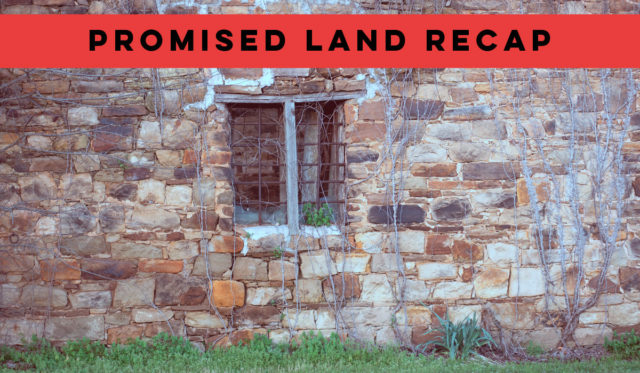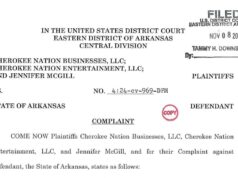

Since the U.S. Supreme Court issued its ruling in McGirt v. Oklahoma last July, journalists have been covering how the ruling affects Indigenous and non-tribal citizens within Oklahoma. The ramifications of the ruling are complex, dealing with both criminal jurisdiction and civil matters, such as environmental regulation, taxation and other issues.
The continuing dialogue regarding these issues is massively important for the state of Oklahoma, and the Muscogee, Cherokee, Chickasaw, Choctaw and Seminole tribal nations.
This post is a part of the Oklahoma Media Center’s Promised Land effort, which shows how the landmark McGirt v. Oklahoma decision will affect both tribal and non-Indigenous residents in the state.
In April, the Oklahoma Media Center launched a collaborative reporting project called The Promised Land: A Supreme Court decision places Oklahoma at a crossroads.
The following recap features the opening paragraphs of four stories that were published between May 19 and May 26 by Oklahoma reporters, as well as an article from the New York Times. To read more from each story, click on the provided hyperlinks.
The snippets below have been edited lightly for date clarity, style and to include additional links to relevant information.
Supreme Court may revisit ruling on Native American rights in Oklahoma
By Adam Liptak
The New York Times
May 26, 2021
WASHINGTON — The Supreme Court, confronting the consequences of its ruling last year that much of eastern Oklahoma falls within an Indian reservation, said on Wednesday that it would temporarily block a decision from an Oklahoma court that threw out a state conviction of a death row inmate. The state court had said the Supreme Court’s ruling required the move.
The court’s three liberal members — Justices Stephen G. Breyer, Sonia Sotomayor and Elena Kagan — dissented from the Supreme Court’s order, which gave no reasons and said it would remain in force while the court considered whether to hear the state’s appeal.
But the order suggested that the court might reconsider or narrow its 5-to-4 decision last year in McGirt v. Oklahoma, which functionally said that a vast chunk of Oklahoma, including much of Tulsa, the state’s second-biggest city, was made up of Indian reservations. The decision barred prosecutions of Native Americans on those lands by state or local law enforcement, saying they must instead face justice in federal or tribal courts.
Read more about the Supreme Court’s potential reconsideration of the McGirt ruling.
How Cherokee tribal courts are handling surge in cases due to McGirt ruling
By Curtis Killman
Tulsa World
May 24, 2021
TAHLEQUAH — The judge had been mowing through a list of defendants when she paused after no one in the gallery rose in response to the latest called-out name.
After a moment, District Judge Amy Page told those in the courtroom that the person who had failed to turn up at the hearing had “mistakenly headed towards Rogers County” District Court instead.
Even though Page was holding court two counties to the east — in Cherokee Nation District Court — it was an understandable mistake these days.
Judicial systems across the eastern half of the state have seen unprecedented change in how they operate since the U.S. Supreme Court’s McGirt vs. Oklahoma ruling 10 months ago, which found that the state of Oklahoma did not have jurisdiction to prosecute criminal cases when they involve an American Indian and the crime occurs within 1860s-era boundaries of the Muscogee Nation.
Read more about the Cherokee Nation’s District Court system.
Oklahoma court to consider whether McGirt ruling should apply to past convictions
By Chris Casteel
The Oklahoman
May 21, 2021
With dozens of convictions already overturned, the Oklahoma Court of Criminal Appeals agreed Friday to consider whether the U.S. Supreme Court decision affirming the existence of the Muscogee Nation reservation should have applied retroactively.
In a brief order issued Friday, the court put on hold a case involving a Native American inmate convicted of second-degree murder on the Choctaw Nation’s reservation and gave District Attorney Mark Matloff and the inmate’s attorneys 20 days to file written arguments. The court also invited Oklahoma Attorney General Mike Hunter (who subsequently announced his resignation May 26) and the Choctaw Nation to file briefs.
The court told the parties to address the question of whether the U.S. Supreme Court’s decision in the McGirt case last July should be applied retroactively to void a conviction that was final before the decision and a related one involving the Choctaw reservation was issued.
Read more about The Oklahoma Court of Criminal Appeals case.
Gov. Stitt expresses ‘deep concerns’ about bill related to court ruling impacting thousands of criminal cases in Oklahoma
By K. Queery-Thompson
KFOR
May 21, 2021
Oklahoma Gov. Kevin Stitt says he has “deep concerns” about legislation introduced in the U.S. House of Representatives related to the Supreme Court’s McGirt vs. Oklahoma decision.
The U.S. Supreme Court decided that the Muscogee Nation reservation was never disestablished.
It’s a ruling that has a big impact on the state’s criminal justice system.
“For anybody that has an Indian card, a CDIB card, a certified degree of Indian blood,” Native American law attorney Robert Gifford told KFOR. “If they are within the [Muscogee] Nation, the state of Oklahoma had no jurisdiction over them.”
As it stands, these decisions alter the state’s legal jurisdiction and law enforcement capabilities on a significant portion of eastern Oklahoma, creating uncertainty for many Oklahomans.
Read more about Gov. Stitt’s “concerns” regarding Congressman Tom Cole’s introduced legislation.
Oklahoma lawmakers direct $10 million for tribal litigation fund to address McGirt fallout
By Carmen Forman
The Oklahoman
May 19, 2021
State lawmakers appropriated $10 million for the state to hire private attorneys to address “legal controversies between the state of Oklahoma and tribal governments.”
House appropriations chairman Kevin Wallace (R-Wellston) said the fund requested by Gov. Kevin Stitt, will be used for the state to address litigation stemming from the U.S. Supreme Court’s landmark McGirt decision.
“Gov. Stitt is pleased that legislative leaders recognize his concern over the uncertainty the McGirt decision has created for the public safety and future growth of our state,” Stitt spokesman Charlie Hannema said in a statement.
However, House Minority Leader Emily Virgin (D-Norman) said House Bill 2951 is written so broadly that it may apply to other disputes between state and tribal governments.





















